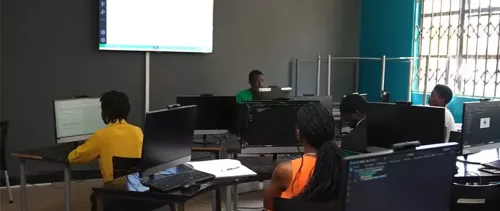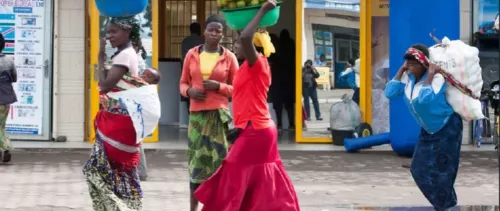
26 June 2019. Dakar, Senegal. Binta is filling the vegetables she sells on her Weebi tablet. The application has helped her manage her stock and sales. @World Bank/Vincent Tremeau
Just before the coronavirus (COVID-19) pandemic struck, just over half of the world’s population approximately (51%) had access to the internet compared with just 30% in Western and Central Africa. With the strict lockdown implemented during the pandemic, many services were only available to people across the region through the internet.
Ever since, the need for universal, affordable, and safe high-speed connectivity has increased exponentially. West African countries will not be left behind and will need to deepen reforms and attract the necessary investments for increased digitalization of services, an essential condition for strong, resilient, green economic growth and quality job creation.
The stakes are therefore high and the region is showing tremendous potential and opportunities. Although the challenges are not to be underestimated, this potential allows us to hope that West and Central Africa will accelerate the digitalization of its economy. What will it take? Three important steps:
Four Challenges
First, we must tackle the digital divide to provide access, usage, and affordability of the internet. Many West and central African countries have been facing four main challenges: low network coverage and quality, high operating costs, barriers to market entry, lack of competition, and high operating and investment risks.
Providing financial services via mobile phones can be difficult when only 40% of West Africans own a cell phone. This underlines the existing disparity between “the haves” and the “have-nots” when it comes to access and affordability of devices, the internet, and digital tools. This disparity also disproportionately affects rural populations, women, and vulnerable groups in the region. And there are significant differences across Africa.
While people in the Central African Republic pay more than 20% of their average earnings for 1GB of mobile broadband data, Egyptians only pay 0.5%.
In Senegal, only 26% of small firms use smartphones, compared with 65% in Brazil. During a pandemic, access to a smartphone not only connects people via messaging, but it can be a useful tool for businesses and economies.
Government Regulation
According to a World Bank/UN Broadband Commission report, it is estimated that the cost of closing this digital divide by 2030 in Africa alone will be US $100 billion.
This is why we must increase investments and attract the needed operators and strategic partners by mobilizing private capital, addressing capital risks, and building strategic alliances between governments and private operators.
We must also support the design and implementation of policies and regulations that de-risk and promote private investment in digital infrastructure. These two levers will help address the issues of affordability and make connectivity productive.
As digital infrastructure improves, there is a need for both the public and private sectors to promote and incentivize internet uptake by developing systems and applications that allow people to do meaningful transactions online, such as applying for government services, opening bank accounts, and applying for credit.
Unlocking New Opportunities with Digitalization
Second, we must build ‘digital stacks’. Our research estimates that half a billion people in Africa lack an official ID, making it difficult for them to access key services and thus being denied the opportunities being created by digitalization.
Identification systems in some countries in West Africa are not yet inclusive and trusted. Current manual, paper-based approaches for identifying their population makes it hard for governments and the private sector to improve how their services are delivered and to reduce fraud and waste.
Digital IDs aligned with the ten Principles on Identification for Sustainable Development offer a solution to this, providing the opportunity to expand and transform delivery of healthcare, education, financial, and other key services, especially for rural populations, women, and the most vulnerable groups.
The good news is that many African countries are well on their way to developing these processes, and many are doing so with technical and financial support from the World Bank and our Identification for Development (ID4D) initiative.
Reliable Data
Digital IDs are one of three components of “digital stacks,” along with digital payments and trusted data platforms. A digital stack allows people and businesses to prove and verify their identity securely, make and receive payments fast and easily, and share and verify personal data, such as credit histories and academic qualifications.
Together, these functions unlock significant social and economic benefits and accelerate the transition to digital economies, societies and governments.
To succeed in the digital transformation agenda, we must work together to empower Africans with greater agency over their personal data and help governments ensure that cash transfers programs and services reach the right beneficiaries, reduce fraud and fiscal leakages.
This needs “whole-of-country” strategies, with strong leadership and coordination at the policy-level. It also needs the definition and implementation of common standards to ensure interoperability at the technical level, a strong data protection, and cybersecurity frameworks.
Finally, we must think boldly with regional and continental approaches. While continuing to drive digitalization efforts at the national level, West African countries must look beyond their own borders. I believe that success in the digital economy requires economies of scale and network effects far beyond what any individual country can muster on its own.
Time for a Single Digital Market in Africa.
Our research in East Africa shows that a more deeply integrated and competitive digital market among the six East African Community (EAC) countries alone would generate up to a US$2.6 billion boost in GDP and 4.5 million new jobs in the subregion. The potential of an integrated digital market in West Africa and at the continental scale is even greater.
To make this vision a reality, we need to support countries in modernizing and harmonizing telecoms and data policies and regulations to promote regional scale investments in broadband and cloud infrastructure and widespread access to relevant digital content and services – including in lagging areas. It will also require streamlining and harmonizing business registration and digital taxation policies, and enabling fast, low-cost, and reliable cross border digital to unlock digital trade and e-Commerce.
But none of this can happen overnight. A digital transformation in Africa will require greater leadership and collaboration from Governments, the Private Sector and Civil Society. We are working closely with sub-regional, continental and international partners, such as the African Union Commission (AUC), the Regional Economic Communities, and Smart Africa.
The COVID-19 pandemic shows a unique opportunity to reverse inequality and promote strong economic growth. Accelerating Africa’s digital transformation can be a part of this reality. It will require closing the digital divide, building digital stacks, and achieving a Single Digital Market. We need to act now.


